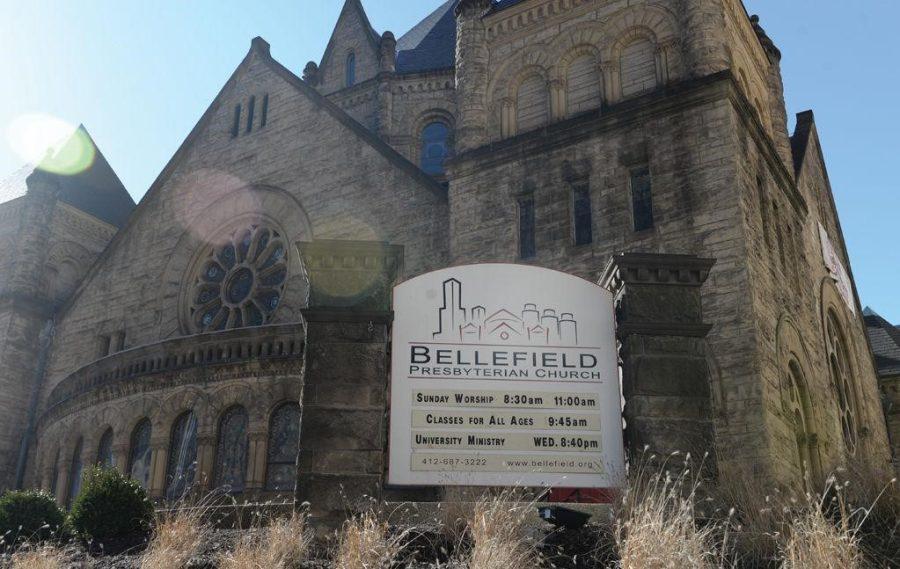Pitt religious orgs adapt to COVID-19 guidelines
Bellefield Presbyterian Church on Fifth Avenue in Oakland.
February 7, 2022
For religious organizations at Pitt, the COVID-19 pandemic has posed a serious challenge, as most typically focus on fostering community and togetherness. These organizations have had to try to replicate that same feeling while following COVID-19 safety protocols and staring at a Zoom screen.
The students and staff of Hillel Jewish University Center of Pittsburgh, Lutheran Student Fellowship and Cornerstone Campus Ministry, some of the many organizations on campus, have continued to meet throughout the pandemic, finding ways to keep building their faith communities and holding events for Pitt students. Each organization has taken different approaches to adapting their events and programs to the pandemic.
All three have had to deal with the challenges of the pandemic in different ways. As University-affiliated groups, they all abide by the guidelines and shelter-in-place orders given by Pitt. When classes were online or hybrid, so were the events for all three groups. Most events had to be either moved online or canceled altogether during the height of the pandemic.
Lizzie Pease, president of Cornerstone Campus Ministries, said the group has seen a noticeable decrease in attendance during the pandemic.
“Anyone who was involved prior to us going online stayed pretty involved, but we did have a significant decrease last year in freshman that got involved,” Pease said. “So people that are sophomores this year, there aren’t a lot of them, because they weren’t motivated to come to another Zoom thing.”
Cornerstone provides an array of volunteering and worship opportunities for Pitt students. Based out of Bellefield Presbyterian Church across from Litchfield Towers, Cornerstone is a non-denominational Chrisitan student ministry. They hold weekly Wednesday worship and discussion groups, as well as various service activities.
Eric Andrae, chaplain for Lutheran Student Fellowship, said LSF has been able to make the best of being virtual by connecting to alumni around the country.
“I reached out to recent alumni, and I said, ‘Listen, we’ll make this a young adult bible study, if you’re under 30 and you’re in San Francisco or Minnesota, or even Berlin, and you want to join us, get online with us,’” Andrae said. “So we’ve had a number of alumni join us, which has been great because obviously they could not fly into Pittsburgh just for Bible study. So that’s been great.”
Lutheran Student Fellowship offers similar outreach and activities for students on campus. LSF is an officially recognized campus ministry at the University, based out of First Trinity Lutheran Church located between Shadyside and Oakland. The student group attends Trinity’s weekly Sunday services and offers a weekly Wednesday night Bible study.
Another religious organization, Hillel JUC, puts a heavy focus on empowering their student leaders and including the entire Pittsburgh community. Dan Marcus, the executive director and CEO, said their organization seeks to offer a community to all Jewish students in Pittsburgh through different activities.
“Our ethos is really that we are welcoming,” Marcus said. “We are here to support and engage with every Jewish student and to help in any way that we can.”
These activities include weekly Friday night Shabbat services, which are primarily run by student leaders. They also hold celebrations for all of the Jewish holidays like Yom Kippur, Hanukkah and Passover. They also host their yearly Ignite summit, which brings Jewish students together from around the country to share what they’re passionate about in their Jewish identity. They host regular events at their Forbes Avenue building that are open to all members of the Pittsburgh community.
Marcus said a big part of Hillel JUC’s goal is to empower their students to organize and help run these events.
“Our objective is that students are the producers of the experiences,” Marcus said. “So for example, with Shabbat, we have services of different types to welcome in the Jewish Sabbath, Shabbat. And then we have a Friday night dinner that everyone’s welcome at, no cost to the student.”
Andrae said their ministry tries to provide a mix of service and recreational activities for their students.
“We go bowling or go to a Pirate game or have a hay ride, bonfire, you know, all kinds of stuff,” Andrae said. “And then we also do a lot of service and volunteer stuff. We distribute clothing, toiletries, diapers, things like that to homeless and marginally housed folk in our neighborhood and beyond.”
Pease said their Wednesday night meetings are not structured in the way traditional worship services typically are.
“It’s not a traditional worship service, but it is kind of a worship service, we do have worship and a guest speaker,” Pease said. “Sometimes they give a sermon or sometimes we just do discussion nights or just sit around and talk with each other about whatever we’re talking about that month.”
Marcus said the transition to online was not ideal, but after more than two years of doing it, they’ve learned to make it work.
“I think that we would always rather be in person together in community,” Marcus said. “However, I think we’ve learned over the last two years, how to make the best of the virtual situation. So whether that’s a class, whether that’s a celebration of some nature, we’ve adapted and learned how to do it.”








